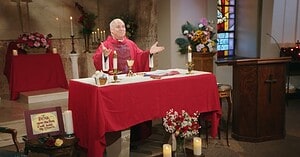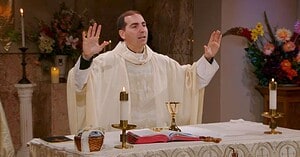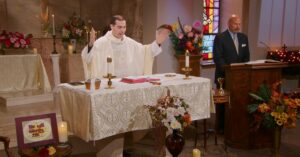Easter Sunday of the Resurrection of the Lord
Homily Video
Easter Sunday of the Resurrection of the Lord Homily Transcript
First of all, a blessed Easter to all of you, especially those who are joining us through television. Whether you’re at home, in a nursing home, in a hospital, know that you are with the entire church here in Chicago as we celebrate the resurrection of the lord.
I’m told that nearly 70,000 people view this celebration of the Eucharist on Easter day, so all of you who are watching are united with all of those people, as well as those of us here who are celebrating. We’re here for you in solidarity asking and praying that the risen lord work in your lives.
There’s something very strange about the gospel we just read if you think about it for a moment. Here is a day in which we proclaim belief that Jesus left the tomb. He rose from the dead, something no one has ever done before or after. His risen state is not just resuscitation, but it’s one that lasts for all eternity. And yet, in the gospel we have today, there’s no sighting of Jesus. You would think that we would choose a text in which Jesus appears, but no. The real resurrection story that we’re given today on this first day of Easter is not about what happens to Jesus, how he is risen from the dead, but what happens to those disciples, how they are raised up, how their lives are transformed and changed. The message is for us today, what does not resurrection mean to us? Is it just a story of 2,000 years ago or does it mean something to the point that our lives our transformed?
What is the leaving behind of death that is involved in this story of the resurrection? There are three things that we see in the gospel that remind us of what death is all about. Death, first of all, makes us motionless. I mean, if we ever see someone in the coffin move, we’re going to be spooked out. We’re motionless. The second is that we’re silent. We no longer speak. The third is that we’re cut off from the ordinary things of this world. And yet each one of those three things are different in the reading that we have today. For those disciples who were dead in their depression with Jesus’ death, who were guilt-ridden because they denied him as Peter did, and who were hovering motionless in a room afraid that maybe their lives are next on the block, they’re running around everywhere hardly motionless. They’re scurrying around. We’re seeing that in fact the one who loved Jesus more than the others and that Jesus loved runs faster than even Peter. There is this flurry of activity.
That is a reminder to us that this day should not just leave us sedentary, but rather we should ask the lord: What is the space I need to move out of in my life, that dead space where maybe I’m self-satisfied with where I am, that sense maybe that I’ve arrived or my life is self-sufficient, and that I become indifferent to other people? Where is the lord moving me now? What’s the step I have to take in order to really be alive and not just motionless?
The second thing that we see is that these disciples, especially Mary Magdalene and then the other disciples as we hear in the first reading, are out there talking quite a bit for people who were silently unto themselves. They were dead silent when Jesus was dying on the cross. They didn’t say anything. They scurried away. They did not want anything to do with it or even Peter’s words denied Jesus. And yet they’re proclaiming. They’re saying something not just about the fact that Jesus is risen from the dead but how their lives are different. For me, that’s an invitation for all of us to experience the resurrection in a way that takes seriously our story. What difference does it mean, what difference does it make for us to say that Jesus is our lord, that we believe in Jesus, the risen one?
It’s an invitation I think for all of us who are older to share our story of faith with our children. I have, time and again, asked older people the question: Do you think that you’re going to be the last Catholic in your family? Sometimes we get to a point in which the way that we can talk to our young people, our children and grandchildren, that’s convincing at all is not to give them the catechism, a bunch of doctrines, but rather let them know why our faith makes any difference to us. Why is it that we believe? How has Jesus changed our lives for the better? That’s how the disciples spoke. They spoke about how their life was different.
The last thing that we see is that three times we hear this mention of this burial plots. It’s not just a filler-in, the story, because John the gospel writer didn’t know what else to put in there. I’ve often wondered whether or not those disciples saw Jesus do something the way that he took care of his own clothes, that he folded them up. Maybe Jesus was a very neat person, which is a nice story to tell your children, by the way, next time their rooms are pretty messy.
I suspect that that action, what they saw of those clothes folded up, reminded them of how Jesus acted. That it took Jesus himself to actually fold up those clothes, to be risen from the dead to do so. In that way, it shows that Jesus, the one who died on the cross, is still in connection with them. I think the resurrection has to be a day for all of us who really believe in immortality and the resurrection of the just that we all aspire to when we come to the end of our life for us to take this day and think about our connections with those who have gone before us, maybe to visit a cemetery in the coming week, to pray for a loved one who is deceased, to think of our own life after death.
My predecessor of happy memory, Cardinal George, said towards the end of his life that he was very curious about what would happen when he died. That’s the kind of curiosity we mean, we need to have. But also a sense of connectedness with those who have gone before us. My parents live next to a cemetery, which also prompted a lot of jokes about how quick it would be to go from one place to another. Nobody ever came over to borrow a cup of sugar either. My father was buried in the cemetery next to our house, and my mother, who had a very difficult time with his death, they were married almost 60 years, decided that on their anniversary, his birthday, the day he came back from the war, other days that were important to them, she would have the caretaker of the cemetery put one of these nice big vigil lights, these sanctuary lamp lights, on his grave so that at night she could look out her window and see it.
In the darkness of her loneliness there was that glimmer, that flicker of light that gave her a sense of hope that that connection that she enjoyed with my father was not broken, that there was still was some connection that she had. I think it’s important for us from time to time to make those connections, visit a cemetery, pray for the dead, give the story, tell the story of someone that you loved to your children and grandchildren to keep alive that connection, not just their memory, in order to for you to see that once death comes, we are not broken off from the others. Jesus wanted to tell those disciples that. Even though he didn’t appear with them, he folded up his clothes in a way that they could recognize, that it was he who did it.
Today, we don’t see the risen lord. He doesn’t make a grand appearance. I have thought if I scripted the resurrection in these scenes in the gospel, I would have written it differently. I would have had Jesus show up at the Pilot’s porch or Herod’s house and made it the biggest “I told you so” in the entire world. Jesus didn’t do that. Instead, he not only rose from the dead but he gave new life to his disciples. They too were raised from the dead. So this is our feast as much as it is Jesus. How is it that the risen lord is working in our life, transforming us not to be motionless, not to be silent, not to be disconnected, but rather truly risen as we say, “Hallelujah, Christ is truly risen”?
Readings
First Reading:
Acts 10:34a, 37-43
Second Reading:
Colossians 3:1-4
Gospel:
John 20:1-9 (42)
Featured Text
A special thank you this week to our friends of Mercy Home for Boys & Girls in the congregation.
Discover More
Saints Peter and Paul, Apostles
June 29, 2025
The Most Holy Body and Blood of Christ
June 22, 2025
The Most Holy Trinity
June 15, 2025
Request Sunday Mass Guide
The Sunday Mass Guide sent to your home address
Spiritual nourishment and updates from the Sunday Mass community
Monthly reflections from Fr. Scott Donahue, our Principal Celebrant


